Lifestyle
The L.A. laundromat offers something special and rare: a home away from home
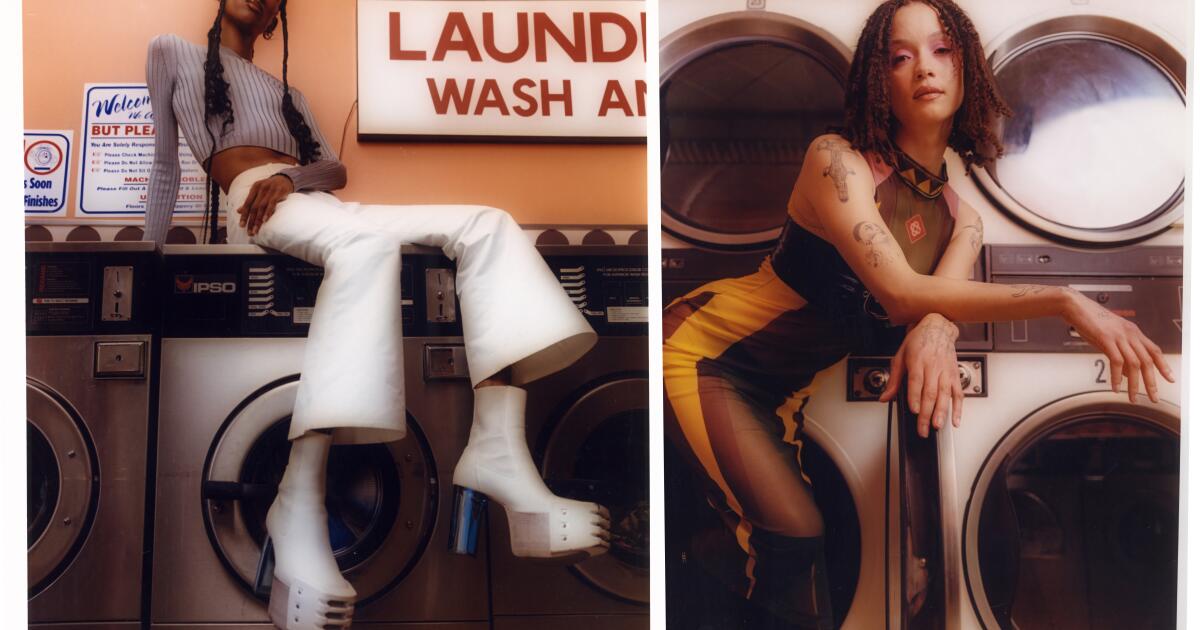
The laundromat is the perfect place to cry in public.
I’m here now, crying as I type this. I don’t care who sees me. I’m tucked away into one of the two-person benches between the silver three-load washers, tears welling up in my eyes near their tipping point. I make eye contact with a man who passes me by on his way to the sink. He looks slightly concerned. But even if I wasn’t partially hidden it wouldn’t matter. I feel safe here. It’s a place that puts intimacy on a rush order, past the point of faux social etiquette. I’m surrounded by people who see the color of my underwear as I pull it out of the dryer. What are a few tears at this point? We’re already well acquainted.
I’ve always been too internal for my own good. I cry in public often because of what’s happening in my imagination. And the laundromat — its familiar, sterile smell of cleaning products and metal, the constant chugging sound of water and hot air — is a place that feels particularly primed for me to slip into my subconscious mind, like sliding into a comfortable pool of Jell-O. I remember things I forgot. I romanticize the Krypto Villain stickers in the quarter vending machines. I sit and stare at people until it hurts. I fantasize about what their lives are like, or all the times they wore those nice faded jeans that they’re pulling out of the dryer while the static shocks their skin. I see a couple sitting under the food tent outside. Their knees point into each other’s while they’re eating, and by their body language alone I conclude that they are, of course, in love. I see a teenage boy shadow-boxing the washing machine in what I decide by a demeanor that I find all too familiar, is a bid for attention. I’m reminded of when I was 14 and needed attention.
An L.A. laundromat is always open, and always waiting for you.
The dryer whirs soft, the fluffy smell of chemical flora rises, the badass little kids with silver teeth run circles around their mom while she folds their Spiderman T-shirts. An image flashes in my mind of myself when I was small — curly hair, dirty Osirises and the fake tattoos I got from the quarter machine fading on my forearm, using the laundry cart like a bumper car or laying my head on a freshly baked mountain of clothes that was just piled into it from the dryer.
I love the laundromat. I’ll tell anyone who will listen. You will catch me at a party giving what might as well be a PowerPoint presentation about the joys of the laundromat. What most people see as an undesirable chore I see as a comfort zone. My own private version of the club, where fluorescent light floods from the ceiling and there’s always Amy Winehouse or Salt-N-Pepa playing over the loudspeaker. My local laundromat is open 24 hours — as all the good ones are — and any time of day or night, for the rest of my life, I know there is a place that is open and waiting for me (as long as I have a hoodie to wash). I’ve never had an in-unit washer and dryer in my many years of living on my own. And it never mattered. Because I have something rarer, more special: a home away from home.
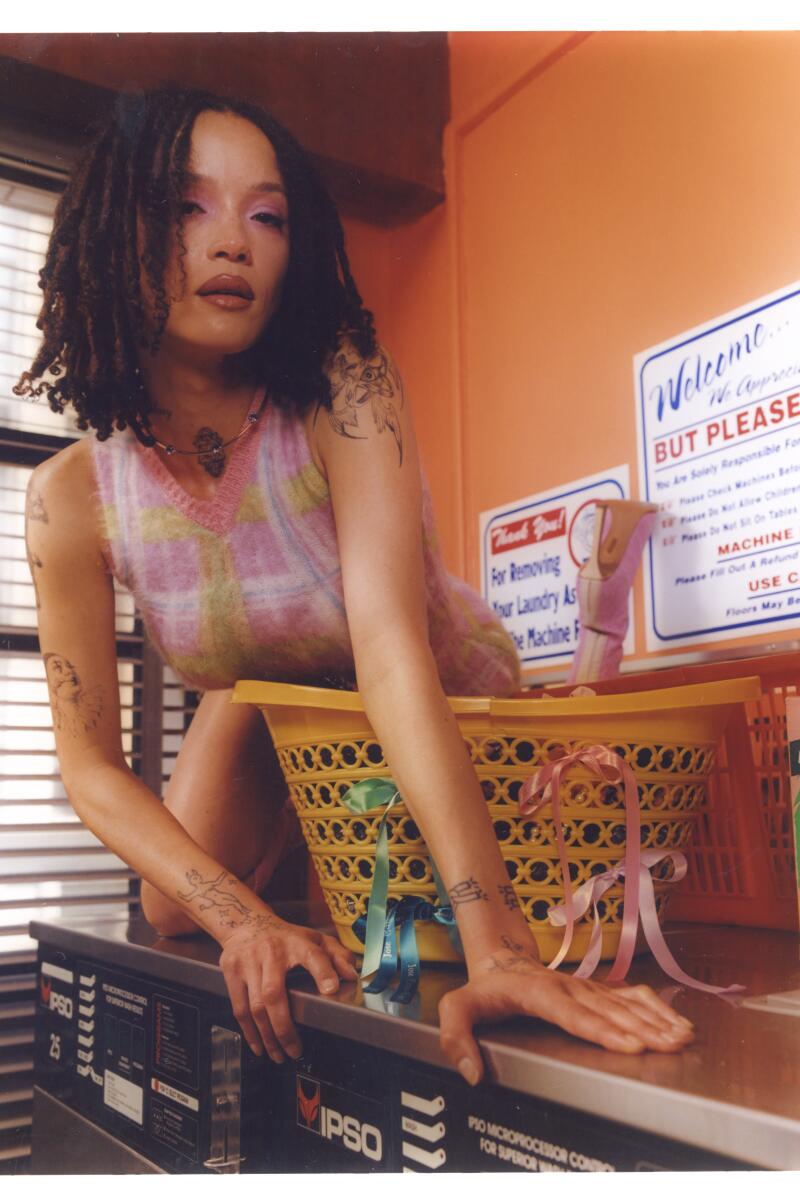
May wears Marni dress, Fendi pink boots.
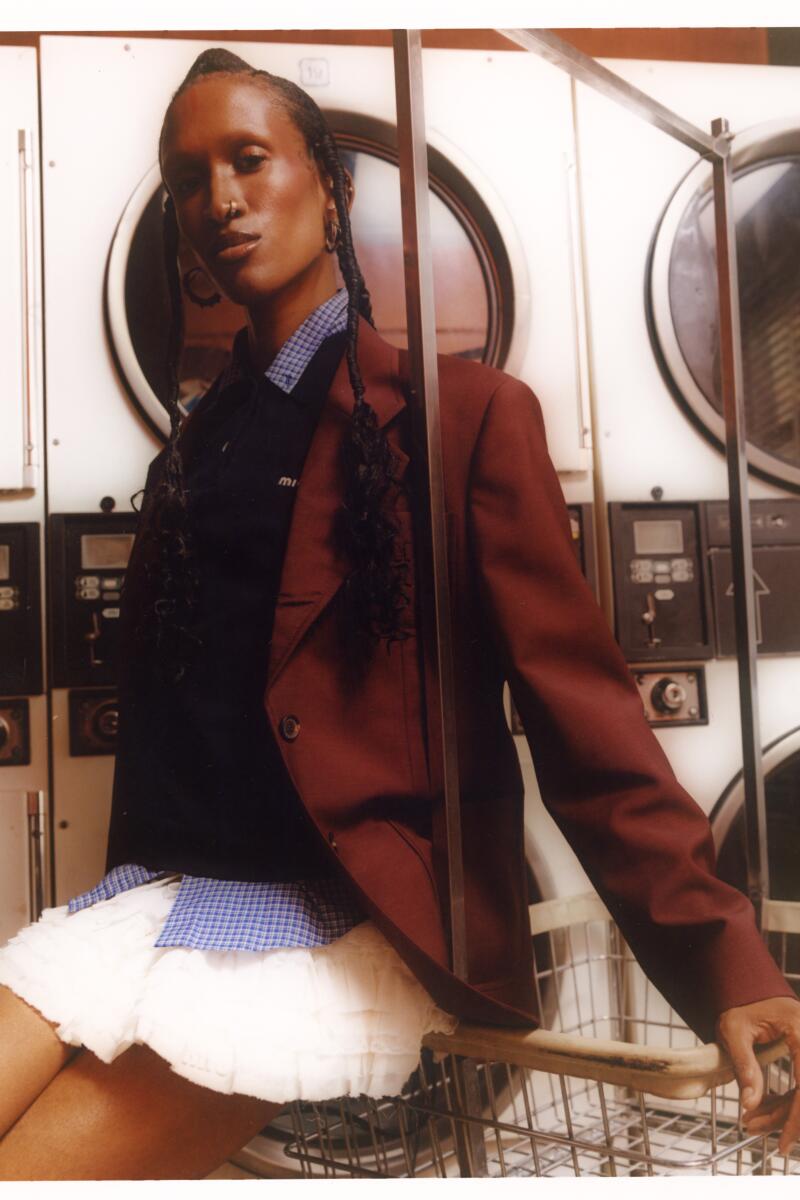
Maahleek wears Miu Miu, model’s own jewelry.
There’ve been rumblings on the internet lately about “third places” — spots people go to that are not their house, not their office, but a secret third thing. “These places are vanishing!” the TikTok feed will warn. Sociologist Ray Oldenburg coined the term “third place” in his 1989 book “The Great Good Place” and expanded on it in his 2001 book, “Celebrating the Third Place.” Oldenburg’s life’s work has been dedicated to explaining why informal gathering spaces matter, and in his writing he defined some characteristics of a true third place, including low barrier to entry, being a status leveler, somewhere that conversations happen and arguably most importantly, being a home away from home. This, Oldenburg writes, is the antidote to isolation, the lubricant of a healthy social balance. “Y’all got nowhere to hangout and it shows,” stated one TikTok creator, who made a series out of suggesting third places.
The experience of the laundromat spills beyond the confines of its walls into its surrounding areas. If you’re doing laundry in a neighborhood like mine, then you’re very lucky, and every single day there is someone selling food on the sidewalk out front. Last time I was there, it was the new-to-me Colombian spot, a Mexican empanada spot and a birria spot that sells it on top of pizza. The smell of soupy, red meat mixing with the unmistakable perfume of Suavitel and Zote shavings. On the weekends in winter, you’ll find the champurrado lady selling Styrofoam cups of the viscous, steaming drink out of the trunk of her minivan.
The parking lot is where all the good things happen. When I was in my early 20s, I used to put my load in and s**** a b**** with my bestie as I waited for the cycle to finish. It’s where I bought someone’s physical mixtape a couple months ago because I’m a recovering people-pleaser, and was in partial system shock from even seeing a physical mixtape. It’s where I can never find parking — even on a weekday evening — because as long as there are days to live there will be laundry to do.
The number of activities done there that have nothing to do with washing your clothes feels specific, in a lot of ways, to L.A. We do all of our photo shoots for our merch brands at laundromats (who among us?), throw experimental punk shows, come up with our best ideas. In my Notes app earlier this year I wrote: “Laundromat culture — places of business and life and love and food.”
I saw a post about a guy who lived in a renovated laundromat in Queens, which felt right to me — something to aspire to. In “The Great Good Place,” Oldenburg writes that third places should inspire the same fuzzy, warm glow of belonging as its inhabitants might find in their own homes. There should be a sense of ownership, of taking up space. I remember this when I Zelle the guy with the Colombian hat $6 for two potato and cheese empanadas. As I sit outside to eat them I notice a parked car with the driver and passenger seats reclined all the way back, two people with their feet up on the dash hold hands as they engage in a romantic, mutual endless scroll on their phones. “That’s beautiful,” I think. We make ourselves at home in places where we need to pass time. We find ways to be comfortable, to turn it into our living room.
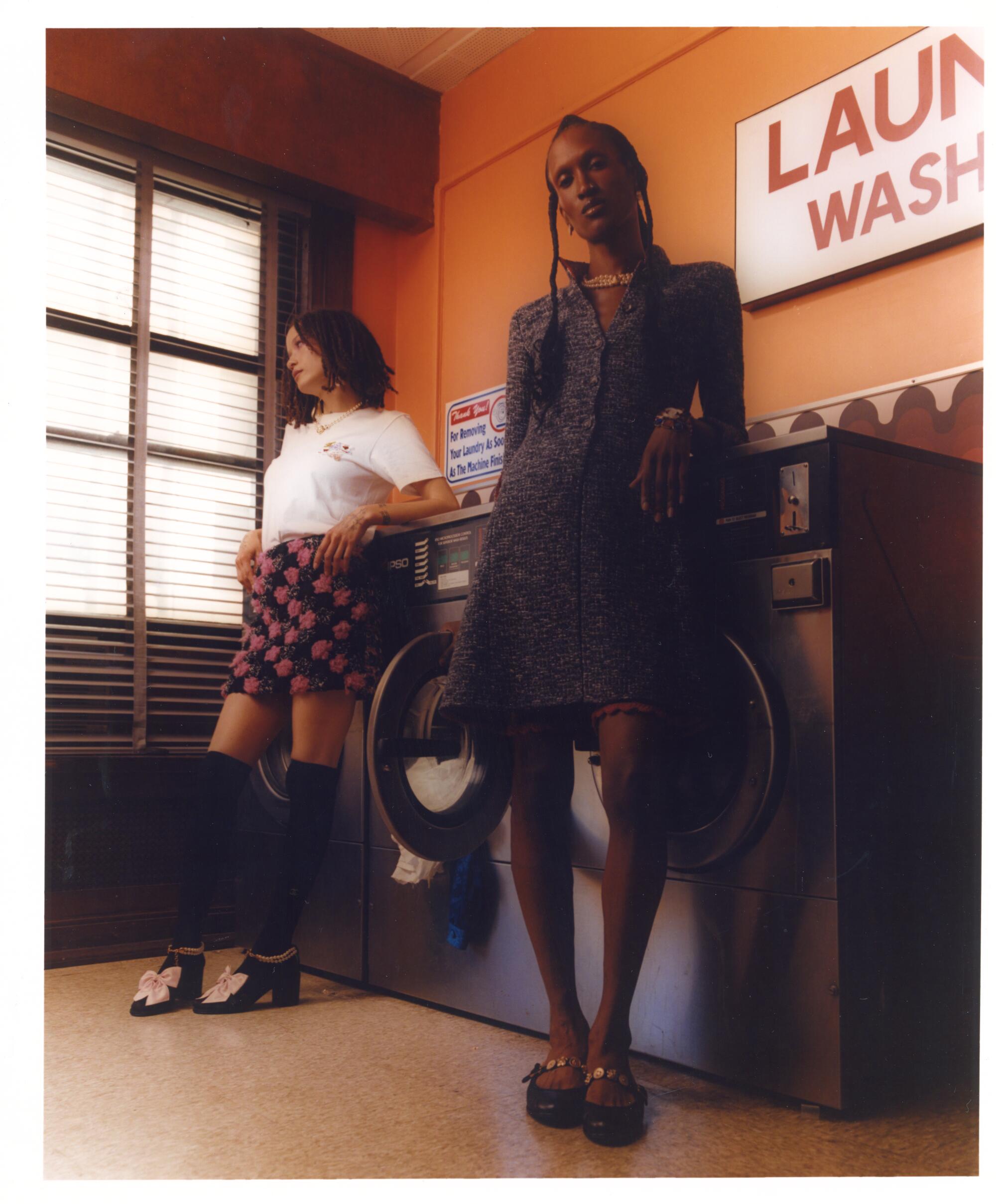
Maahleek and May wear Chanel.
When my mom comes to visit me she always takes a load of my laundry to wash at the laundromat I’m at now. (Yes, I’m 29, but her love language is “acts of service,” so sue me.) Every time, she comes back upstairs to my apartment with freshly folded T-shirts (and a blouse she shouldn’t have put in the dryer but did anyway) and regales me with a new story of an hourlong conversation she had with a stranger — the latest in her laundromat saga. I’m more the observant type. The interactions I usually have here are swift, but I still find them deeply meaningful. I notice a lady selling intricate gold-plated rings on one of the tables by the window, the natural light bouncing off the metal tray as the afternoon sun makes its descent. I ask her about them. All of these little moments fill me with the feeling of being human. There is so much talk about a need for connection, a need for community, but no one wants to spend an hour of their week philosophizing intense beauty in the mundane at their local laundromat, do they? That’s what I thought.
An important part of the laundromat experience is the massage chair. It’s the only spot that offers a soft surface to sit inside the actual building, and treating oneself feels right in a place like this. I sit in it long enough before it yells at me to put money in — I never get the actual massage, of course. I get up and relocate to a spot where I can watch the meticulous dance of a big family folding their clothes. They always have, like, 15 kids and 10 loads of laundry — an assembly line that communicates: We ain’t new to this. They quickly take up an entire counter and move with accuracy. I see one family bring a mega Tupperware container filled with hangers, attaching each of their nice button-up shirts like clockwork. It’s hypnotizing. I spot a long chartreuse dress with a flower detail that I would never wear but am deeply intrigued by. In the background, there are moments of intensity that bubble up and dissipate — a rush will be interspersed with serene moments — mimicking the flow of anything else in life.
And as soon as I slipped too deep, I’m jolted back to reality by two women arguing over a dryer, which is a normal interaction here. It went on for 15 minutes, each one of them throwing strays long after the initial confrontation was finished. Draaaaama, I thought. And I laugh to myself. Because that’s what happens when you’re comfortable, when you’re at home, when you’re with your family.
Production: Mere Studios
Models: Maahleek, May Daniels
Makeup: Selena Ruiz
Hair: Adrian Arredondo
Photo Assistant: Dillon Padgett
Styling Assistant: Deirdre Marcial

Lifestyle
In pursuit of radical honesty, 'Jerrod Carmichael Reality Show' delivers ambiguity

Jerrod Carmichael in Jerrod Carmichael Reality Show.
HBO
hide caption
toggle caption
HBO

Jerrod Carmichael in Jerrod Carmichael Reality Show.
HBO
Peruse any online thread discussing Jerrod Carmichael Reality Show, the disquieting HBO series created by and starring the titular comedian and filmmaker, and colorful descriptors like “pretentious,” “mega narcissist,” and “self-righteous piece of [redacted]” are bound to appear.
“This show seems kinda invasive,” one observer noted on Reddit. “… I’m not sure what the obsession is with public humiliation … About a year ago, I was very much a fan of his honesty and what seemed to be [a] down to earth personality but it looks like it’s morphed into the narcissistic cry for help.”
Carmichael earned a lot of good will from his 2022 breakout standup special Rothaniel, in which he — among other things — came out publicly as gay and processed his mom Cynthia’s devout homophobia. It launched him into the “mainstream”; that is, a stratosphere where one wins prestigious awards, guest hosts Saturday Night Live, and makes headlines for easily agitating the ever-crotchety elder statesman Dave Chappelle.

He was easy to root for because he treated the performance like a therapist’s couch, a safe space where he could break through the silence that encourages shame and deceit. It was different from, but in the lineage of, Richard Pryor’s recounting of his own drug addiction in Live on the Sunset Strip – confessional, blunt, and refreshingly relatable to those who’ve shared a similar experience, delivered in the way only a gifted and self-aware comedian can.
But Reality Show practices an entirely different mode of candor. On camera, Carmichael cheats on his boyfriend Mike and later lies about it during their couples therapy session. He misses a friend’s wedding because he makes a pit stop to get a hot dog along the way. (He was supposed to be the best man.) He goads his parents Joe and Cynthia into having raw, painful discussions about their once-private lives and tightly held beliefs.
All of this is done in service of what he sees as a greater good: radical honesty, which he in turn hopes will lead to stronger bonds with his loved ones. Yet for some, the show has morphed the perception of him from that of an artist valiantly speaking the truth to an exhaustingly selfish crusader for a very specific truth — his own. And whether or not he succeeds at repairing his fractured relationships is only partially answered by Reality Show‘s finale, which aired Friday.

Carmichael in Rothaniel, his 2022 special.
HBO
hide caption
toggle caption
HBO

Carmichael in Rothaniel, his 2022 special.
HBO
Reality Show stands apart
If Rothaniel was presented as catharsis, Reality Show arguably functions as exploitation. It’s one thing to process grief, pain, and pathos through your art; it’s utterly baffling to directly involve the sources of that pathos in your artistic process, particularly when they seem formidably resistant to even acknowledging themselves as the source.
This isn’t the first time. In 2019, Carmichael released two HBO documentary specials that also featured him in conversation with his family, Home Videos and Sermon on the Mount. Home Videos is where he first tested the waters to see how his mom would react to him coming out to her. On camera, he offhandedly dropped in an admission that he’s hooked up with men but stopped short at identifying as gay. Cynthia barely acknowledged the unexpected disclosure.
As Carmichael told Dave Holmes for Esquire, the silence from his parents after coming out is what pushed him to create Reality Show in the first place: “The lack of acknowledgment is what made me go, ‘Okay, I’ll turn the volume up.’ How do I make it as extreme as possible? It’s testing the limits of their cognitive dissonance.”
The extremities make up a strange gumbo: One-part old-school docu-style reality TV (in a different era, this could’ve been True Life: “My Mom’s a Homophobe”); a dash of trashy celeb-reality (think Being Bobby Brown or Britney & Kevin: Chaotic); and another part self-referential prestige experiment (Sarah Polley’s Stories We Tell or How To with John Wilson).
For all its cross-cultural parallels, though, Reality Show stands apart. To his credit, while he has near-total creative control as the creator, co-executive producer, and star, he’s willing to show himself being challenged by his own cognitive dissonance. Within the first few minutes of Reality Show, he makes his MO plain: “Cameras make me feel more comfortable, I like this — it seems permanent, and it feels really dumb to lie.” And yet, we later watch him lie on camera about being monogamous during a couples therapy session with Mike, proving he struggles to adhere to his own ethos, at least at first. (As the season carries on, he and Mike try out non-monogamy together, and seem to find that it works for them.)
The reality TV genre feeds heartily upon the judgmental instincts of its viewers. It needs audiences to engage with it as gossip fodder and opinion-generator, encouraging those who tune in for the “real”-ish drama to scoff at the foolish personalities, cheer on the likable heroes, and boo the flamboyant antagonists. Carmichael clearly understands the format – unscripted in theory, though manipulated and edited to make the “real” fit more neatly into a dramatic arc – and bends it to his will. And while the crudest entries in the reality genre tend to bring up social issues and prejudices either unintentionally or superficially, with Reality Show, Carmichael chooses to purposefully expose the issues in the name of raw, unfiltered honesty.
“I think this will be good for you”
In the mid-2010s, he co-created and starred in the loosely autobiographical network sitcom The Carmichael Show. Far more subversive than its multi-camera, live studio audience format let on, it positioned him as a nihilistic provocateur who revels in frank, multi-generational conversations on an assortment of hot-button issues with his fictional family: abortion, assisted suicide, mass shootings, depression. (It’s frequently, and aptly, been referred to as a modern-day All in the Family.)
A Season 2 episode focuses on Jerrod’s dad Joe (David Alan Grier) as he prepares to deliver a eulogy for his own father, who was abusive and abandoned the family long ago. Jerrod doesn’t understand why Joe would want to honor him – “Am I the only one who remembers what a deadbeat that man was?” – but Joe feels bound by the tradition of never speaking ill of the dead. Jerrod counters that if Joe is going to give the eulogy, he should at least tell the truth about who the man was: “I think it will be good for you.”
YouTube
That line could’ve been the tagline for Reality Show, which finds Carmichael butting up against the people in his life — many of them older — who bristle at his desire to revisit painful memories from the past. In the fourth episode, Jerrod attempts to have a straightforward conversation with his real dad Joe, and pelts him with a rapid-fire series of questions about the double life Joe led for years, which included having a secret second family with another woman.
“Would you say you loved [the other woman]? Or was it just like, sexual, or was it — ’cause it was a long time, what – like, 40 years of a relationship? Was it hard every time? Did you feel like a bad person?”
Joe, clearly uncomfortable, begins to shut down and insist that the past is the past, but Jerrod keeps pressing him. Joe snaps back: “Why are you digging into this so deep, son?”
I think it will be good for you.
“Is this gonna be on your special?” Joe wearily asks. “This is hard for me to discuss on cameras.”
Doing this in front of cameras is the only way Carmichael, a late-30s millennial who came of age in the early years of oversharing – The Real World, blogging, Facebook – knows how to have (or force, really) these conversations. It’s telling that, spliced throughout some of the episodes, Reality Show includes footage from the Carmichael family’s home videos going back decades, some of which Jerrod himself shot as a kid with a camcorder. The grainy images root the present-day points of conflict firmly in an “authentic” past, suggesting that this project was predestined, something this artist has unintentionally been working toward for decades.
“Your option is no option,” Jerrod snaps back at Joe around that campfire, “so don’t criticize the way I do it. If the cameras help me, then they f—— help. But your way is nothing, your way is silence, your way is death.”
Eventually, Joe is tapped out. “You’ve expressed yourself … can I go home?”
The camera gives Jerrod courage, a security blanket to wear while attempting to address the distance between him and Joe, yet it’s not yielding the results he’s looking for. It’s hard not to wonder if the cameras are actually hindering him in the long run, keeping him stuck on the false hope that others around him – who have thus far only proven rigid in their stances – might open up to him the way he wants them to.
Bending his truth for his mom
At the core of Reality Show, nestled beneath the layer of a mission for radical truth, is Carmichael’s determination to radically alter worldviews. “Could my mom change?” he ponders at one point. He surmises, “It’s reason to keep fighting.”
“I’m not going to sit here and lie to you,” his uber-Christian mom Cynthia insists in the finale, while repeating yet again that she’d “prefer” that he isn’t gay. (In an earlier episode, she likened homosexuality to being a murderer.) Cynthia might be the most authentic of all the figures in Reality Show, unapologetically herself. His impasse with her has less to do with avoiding the truth than it does the fact that her truth stands in direct opposition to his.
She visits Jerrod and Mike in New York City for Mother’s Day weekend, and he takes her to a queer-friendly Harlem church, where the pastor pushes back against her insistence that the Bible condemns homosexuality. Later they meet with a queer therapist for joint counseling. Neither of these experiences sees her budging from her stance: “I’d like for him not to be gay,” she tells the therapist during one-on-one time, adding matter-of-factly, “I can go further [with my acceptance], I just choose right now not to … I don’t want to.”
Later, when she reiterates her desire for him to find a woman to settle down with, he tries meeting her on her terms: He consents to letting her attempt to pray away the gay in front of him. She’s truly giddy; it might be the happiest she appears in the entire show. “I love you. That blessed my heart,” she says, satisfied. She’s completely unaware (or unbothered?) by how her son’s body seems to recoil out of deep discomfort.
In an effective bit of dramatic editing, the prayer immediately cuts to Carmichael remarking on the moment during a standup performance. “She was so happy that I let her do it. I immediately regretted it.”

Jerrod Carmichael in Jerrod Carmichael Reality Show.
HBO
hide caption
toggle caption
HBO

Jerrod Carmichael in Jerrod Carmichael Reality Show.
HBO
Throughout Reality Show, Carmichael imagines standup snippets as if they were a more elevated version of a confessional booth, that reality TV convention where the cast members get to narrate their perspective of the story unfolding. It’s devastating watching him concede to her, to allow her this delusion. But there’s life as-it-happens and life as reflected upon later. And it’s important to note this doesn’t come out of nowhere; this has been years in the making, with long periods of absence and occasional heated exchanges, some of which were captured on camera. Through his extravagant attempts at familial reconciliation, Jerrod’s ultimately realized he has to bend his truth a little to maintain some sort of relationship with Cynthia.
I think it will be good for you.
“You know what I realized I need is a reason to believe everything will be OK,” he adds. “I’m always looking for that. When I was young, I found it in my mother. And now, I’m finding a lot of that in [Mike].” As he says this, a montage of images flurry by: Cynthia packing her bags in her hotel room to go back home to North Carolina; a younger Cynthia smiling for the camera in a home video; Mike teaching Jerrod how to swim in a pool.
A revelatory viewing experience
And yet the finale also suggests a small but perceptible shift in Jerrod’s relationship with Cynthia, and proves the show is more than a masochistic, navel-gazey affair (though it’s certainly that, too). This is soap opera verité in its most anarchic state — almost certainly a terrible idea for everyone involved, but quite possibly a learning experience for those observing from the outside looking in.
The post-credits sequence is jarringly optimistic. The final image is of Mike and Cynthia laughing together in her kitchen in North Carolina a few months later; she even places her hand affectionately on his back for a quick moment. We have no idea if Cynthia still believes Jerrod and Mike are on equally sinful footing with murderers, though the scene implies something within her has softened.
It’s unclear what we’re supposed to make of this – that maybe Jerrod’s persistence has actually helped him reconnect with his family? If so, it’s worth considering Reality Show a success for what he’s said he wanted out of this project, even if there’s reason to be disappointed in the concessions he may have had to make to get there.
The impulse to question why any of this needed to happen in such a public manner doesn’t completely recede with this conclusion, though maybe it makes the show’s existence easier to digest. In any case, the ending is hardly pat — real life plays out on its own terms away from the cameras — and Reality Show‘s frank depiction of a Black queer man attempting to push back against his family’s culture of silence moves the needle even further than Rothaniel did. He’s provided viewers with an imperfect guide for how to have difficult but necessary conversations with the people they care about (preferably without dropping a camera crew in the mix).

Clay and his mom Margarita on Love is Blind.
Netflix
hide caption
toggle caption
Netflix

Clay and his mom Margarita on Love is Blind.
Netflix
Oddly enough, Reality Show shares a bit in common with the most recent season of the absurdist Netflix dating series Love Is Blind, which featured Clay, a young Black man who also dealt with unresolved trauma stemming from his own dad’s infidelities in a very public manner. The show’s silly “social experiment” — above all designed for maximum gawking and entertainment — inadvertently stumbled into a candid and relatively honest discussion about Black masculinity and generational trauma.
At Clay’s doomed wedding ceremony to AD, his mom Margarita, no longer married to his dad Trevor, gave the series its truest moment thus far, when she explained to Trevor how his actions were affecting their son all these years later. “Your past and things that you witness, it’s part of your DNA. It’s part of your inside. And if you don’t get freakin’ help, you bring that s— into the next thing.”
Clay brought his baggage into Love Is Blind and Jerrod brought his into Reality Show. Disarray ensued and feelings were hurt. There’s a silver lining though: In making highly questionable decisions for all the world to see, they forced conversations that need to be had but often aren’t, and perhaps some viewers may come away feeling inspired to confront similar issues in their own lives. Even amid all the mess, some honesty managed to break through the silence.
Lifestyle
Kanye West and Bianca Censori Dine at Denny's Amid Major Yeezy Changes
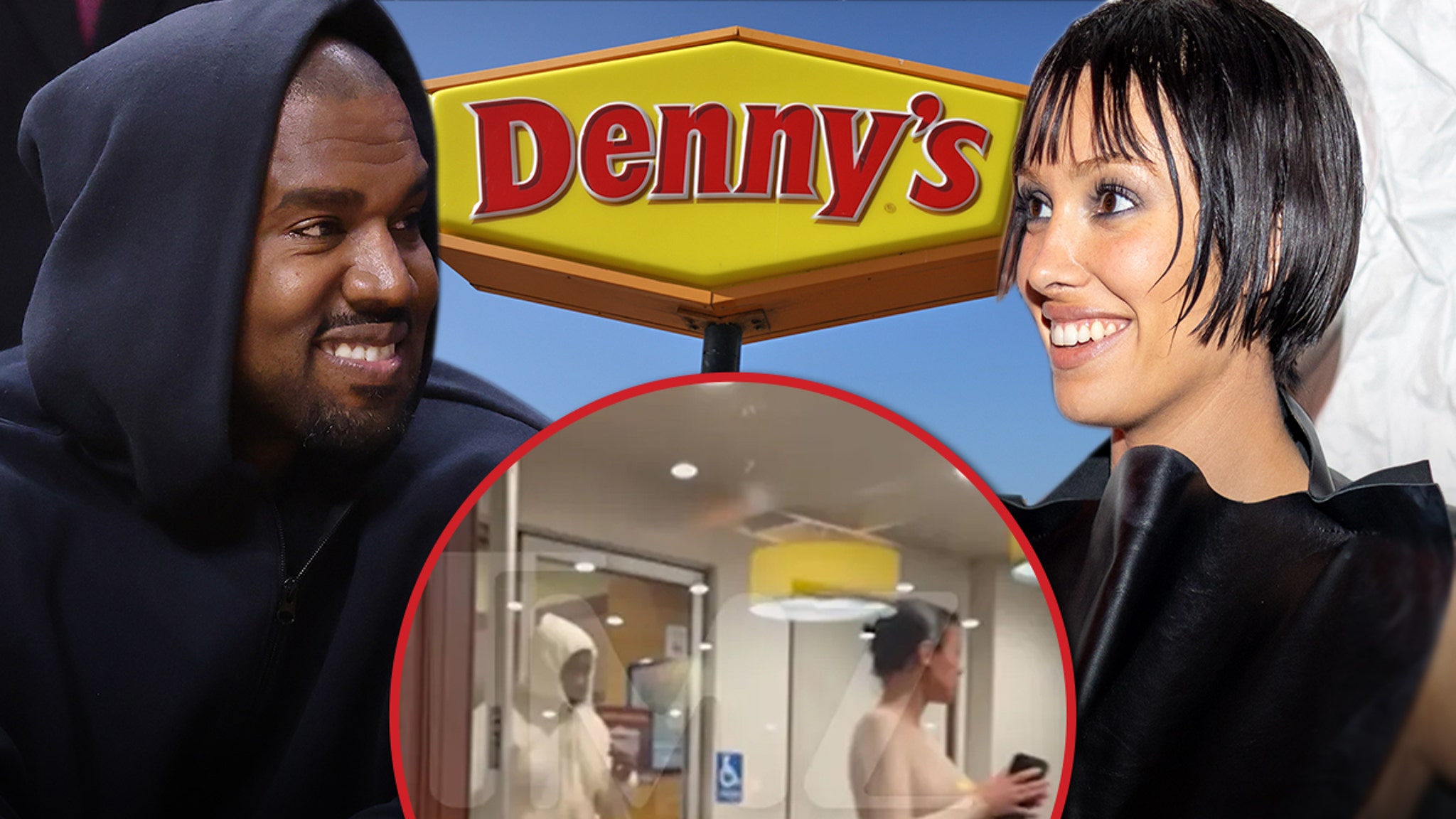
Kanye West and Bianca Censori chowing down at America’s Diner isn’t something you’d expect, but their affordable meal comes as a major shakeup goes down at Ye’s company.
New video obtained by TMZ shows Kanye — with a white hoodie tight around his face — walking into a Santa Barbara Denny’s behind Bianca, who was in one of those skintight nude-colored bodysuits she loves. They were keeping a somewhat low profile, but it’s clearly them.
TMZ.com
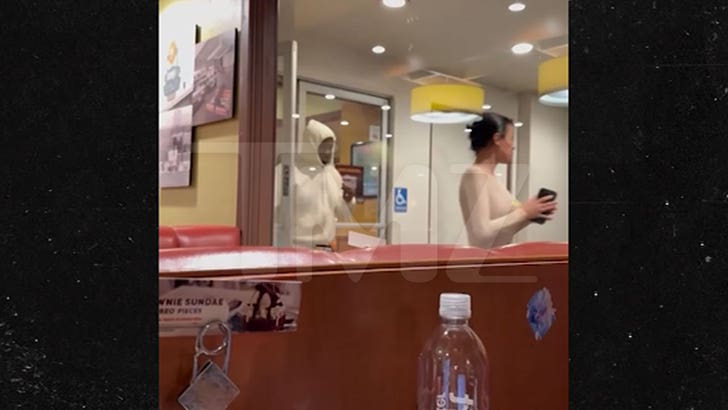
We’re told they arrived at the restaurant around 8 PM Monday, and were very animated with each other during their meal. Plus, eyewitnesses say an issue with the food might have sparked an argument with their server.
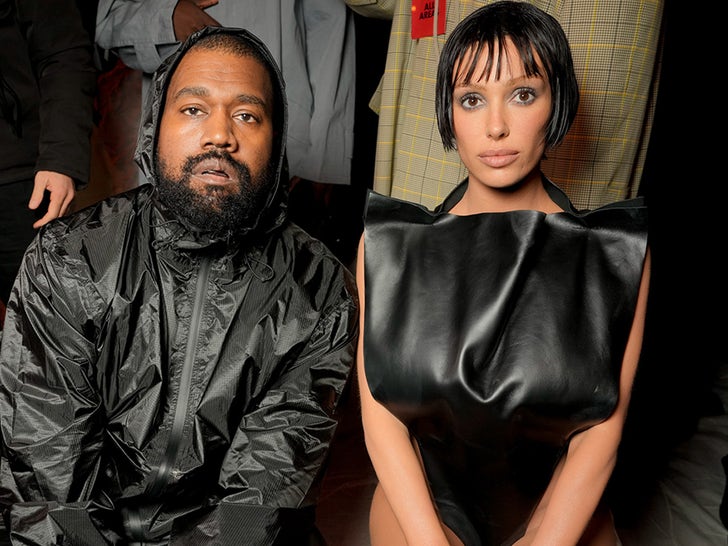
Kanye appears to have driven his Tesla Cybertruck to the meal, because one’s sitting in the parking lot in a different clip — not the most common vehicle among the Denny’s crowd.
TMZ.com
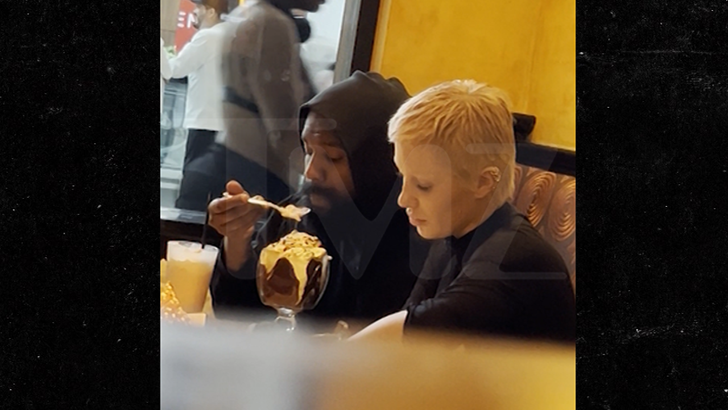
4/24/23
KW and BC are known for their down-to-earth palates … they’ve eaten at the Cheesecake Factory and other restaurants frequented by normies during their time together — as well as celebrity spots like Nobu.

Unclear if they talked business at dinner, but Ye’s certainly got a lot on his mind when it comes to Yeezy — sources with direct knowledge tell us there is a mass exodus occurring at the company.
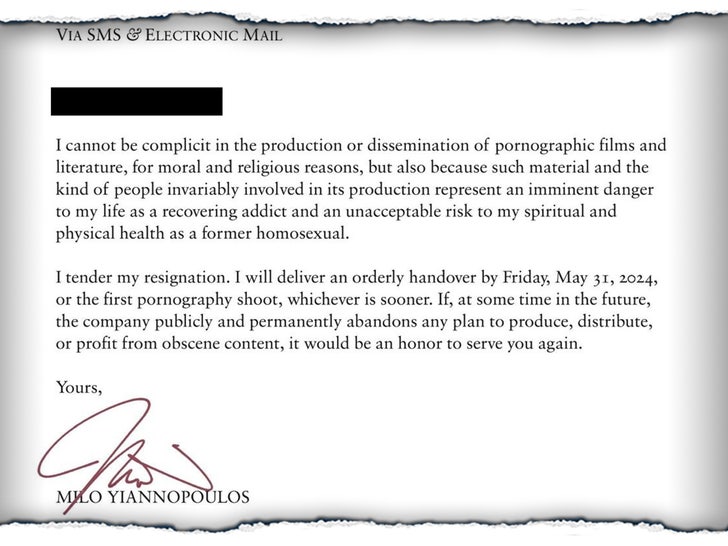
As we reported … West’s Chief of Staff Milo Yiannopoulos tendered his letter of resignation over his objection to the Yeezy porn studio Ye’s mulling.
We’re told a ton of other employees are also leaving the company — but it’s unclear if they’re all bolting over the porn venture, or other issues.
Hey, no better brain food to inspire big biz decisions than a Grand Slam, or maybe Moons Over My Hammy!
Lifestyle
The lesson Chris Pine learned after his new film was 'obliterated' by critics : Wild Card with Rachel Martin

Chris Pine says he has “fantastic anxiety dreams.”
Dia Dipasupil/Getty
hide caption
toggle caption
Dia Dipasupil/Getty

Chris Pine says he has “fantastic anxiety dreams.”
Dia Dipasupil/Getty
A note from Wild Card host Rachel Martin: The other day I was talking to It’s Been a Minute host Brittany Luse. I was asking her some of our Wild Card questions and one that came up was about what it means to live a good life. She said a good life is one in which you get to be exactly who you are — one where you don’t have to fake how you show up in the world.
I keep thinking about that answer. I think we all find ourselves doing things that aren’t authentic to us — to please our parents, impress our friends or to meet some societal standard of success. But as someone who recently took a big leap away from that, I can tell you it feels pretty liberating. It can be scary too, though, because creating something new and personal means when people don’t like it, well, it’s on you.

And this is where Chris Pine is at right now in his life. By most accounts, he’s got it made. He’s played Captain Kirk in a few Star Trek films. He was Wonder Woman’s boyfriend and played the hero in the Dungeons and Dragons movie. He could have just ridden that handsome hero thing off into the sunset. But it turns out, Pine is a lot more than that (and frankly he’s a lot weirder than any of those roles let him be.)
His recent movie, Poolman, is his way of showing up in the world in his real skin, so to speak. Pine wrote the movie with his friend Ian Gotler, and Pine directs the film and stars in it. This is his baby from start to finish. So when critics trashed the movie, it was tough, as you’ll hear in our conversation. But he’s not sulking about it, because he made a thing he loved that felt true to his creative brain. And you can tell in the movie, he’s just having the best time. That seems like the good life to me.
The trailer for Poolman.
YouTube
This Wild Card interview has been edited for length and clarity. Host Rachel Martin asks guests randomly-selected questions from a deck of cards. Tap play above to listen to the full podcast, or read an excerpt below.
Question 1: What was a recurring dream you had growing up?
Chris Pine: I grew up with this beautiful sycamore tree in my front yard. And I had a dream that this elf lived in this sort of subterranean lodge that had a connection with the tree in my front yard and this little door next to my garage.
And I remember going in and having tea with the elf. It probably was engendered by my mother. She told this fantastic recurring story about this family of mice that lived in the sycamore. So I think that’s probably what dropped in my brain and percolated around and flowered into that dream.


Rachel Martin: I love that though, because it was mostly positive.
Pine: I don’t have nightmares, thank God. I have anxiety dreams, I have fantastic anxiety dreams. But no, that was the one growing up that I remember the most.
Martin: Did you have any anxiety dreams when you were young or that’s mostly an adult experience?
Pine: I’m sure I did. I was a very anxious child and a pretty anxious young man and still am, but have wrestled with that demon for long enough that I think we’re in a stalemate, at least for the most part now. But no, my more interesting anxiety dreams are now.
Question 2: What’s a goal you’re glad you gave up on?
Pine: Perfection. My film got absolutely just decimated when it premiered in Toronto, just like obliterated. I didn’t read any of [the reviews]. Thank God. But I heard enough to know that people really didn’t like it. Which brings up for me one of my primary triggers, or whatever, is not being liked or this idea of perfection, of not creating something that is perceived as [perfect].
So in many ways, this journey thus far has been so great to remember: I had joy. I experienced joy. It still gives me joy. That’s it. That’s enough. There is no perfect. That is perfect. There’s nothing more perfect than that.
Question 3: Is there anything in your life that has felt predestined?
Pine: Poolman felt predestined. I call it, like, a snowball. A snowball starts growing and at a certain point, the snowball is so f****** large, it’s just falling downhill. You can’t do anything about the snowball falling down. You just get out of its way and let the snowball fall down the hill.
That’s what acting has felt like. That’s what writing and directing and acting in this film has felt like. That idea of it being fated, I totally buy.

Martin: Huh. And that surrendering – I mean, you had total agency over this film. You made this film, but in some ways, it got to a point where it took on a life of its own and then you just let it happen?
Pine: One of my defense mechanisms is being cerebral, using words to block the emotion. And so this process of making this film was a way for me to simply follow instincts, simply follow emotion. So this idea of, like, it came out — this is what my brain and body wanted to do collectively together. It was the most harmonious in that regard.
-

 World1 week ago
World1 week agoPentagon chief confirms US pause on weapons shipment to Israel
-

 Politics1 week ago
Politics1 week agoRFK Jr said a worm ate part of his brain and died in his head
-

 Politics1 week ago
Politics1 week agoOhio AG defends letter warning 'woke' masked anti-Israel protesters they face prison time: 'We have a society'
-

 Education1 week ago
Education1 week agoVideo: Police Use Pepper Spray on Protesters on G.W.U.’s Campus
-

 News1 week ago
News1 week agoNine Things We Learned From TikTok’s Lawsuit Against The US Government
-

 Politics1 week ago
Politics1 week agoBiden’s decision to pull Israel weapons shipment kept quiet until after Holocaust remembrance address: report
-

 World1 week ago
World1 week agoA look at Chinese investment within Hungary
-

 News1 week ago
News1 week agoThe Major Supreme Court Cases of 2024

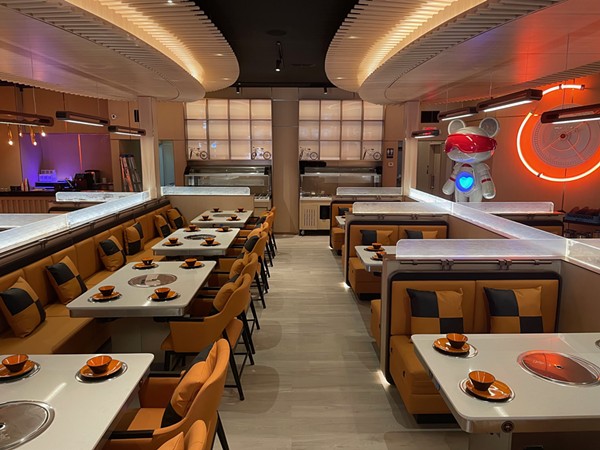


:quality(70)/cloudfront-us-east-1.images.arcpublishing.com/adn/5BVPQDP3BNCD5CBOOCBDNH6Q5I.jpg)










